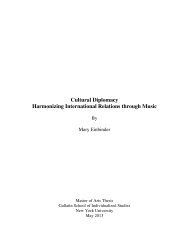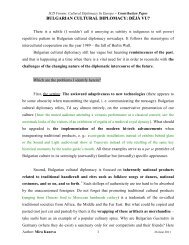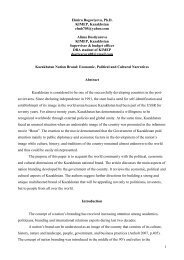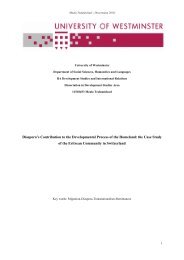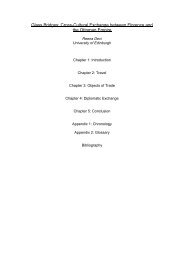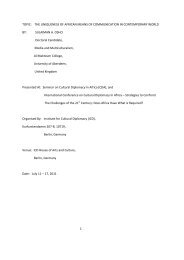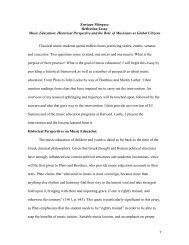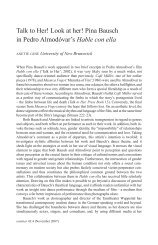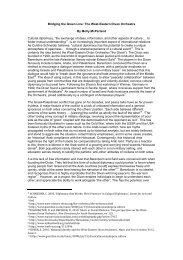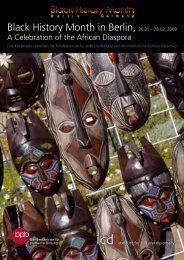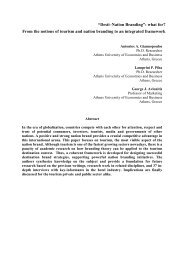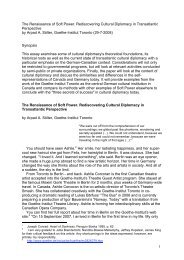Country Profiles: Germany - Institute for Cultural Diplomacy
Country Profiles: Germany - Institute for Cultural Diplomacy
Country Profiles: Germany - Institute for Cultural Diplomacy
You also want an ePaper? Increase the reach of your titles
YUMPU automatically turns print PDFs into web optimized ePapers that Google loves.
6.2 Goethe-<strong>Institute</strong><br />
Agent of <strong>Cultural</strong> <strong>Diplomacy</strong>: The Goethe-<strong>Institute</strong> in cooperation with, among others, the Ernst<br />
von Siemens Musikstiftung, Kulturstiftung des Bundes, Robert Bosch Stiftung<br />
Agenda: Encourage international cultural exchange<br />
Vehicle of <strong>Cultural</strong> <strong>Diplomacy</strong>: Organising cultural and linguistic programmes and events, and<br />
making contributions to various festivals and exhibitions in the fields of film, theatre, literature and<br />
translation<br />
Target Audience: People interested in teaching and learning German as a <strong>for</strong>eign language, persons<br />
generally interested in <strong>Germany</strong><br />
The Goethe-<strong>Institute</strong> e.V. is an institution acting on behalf of the Federal Republic of <strong>Germany</strong> in<br />
the issues of <strong>for</strong>eign cultural and educational policies. The <strong>Institute</strong> was founded in 1951 as a<br />
replacement of the German Academy (Deutsche Akademie, DA). Its first task was to offer further<br />
training <strong>for</strong> <strong>for</strong>eign German teachers in <strong>Germany</strong>. In 1959/ 1960 the Goethe- <strong>Institute</strong> took over all<br />
of <strong>Germany</strong>’s cultural institutes abroad. During the students’ revolts in the late 1960s the <strong>Institute</strong><br />
adapted its programme of cultural events to include socio-political topics and avant-garde art. Since<br />
the 1970s the concept of ‘extended culture‛ <strong>for</strong>med the basis of activities at the Goethe-<strong>Institute</strong>. In<br />
1976 the Goethe-<strong>Institute</strong> became an independent cultural organisation based on a general<br />
agreement with the Foreign Office. After the fall of the Berlin Wall, the activities centred on Eastern<br />
European countries and there<strong>for</strong>e many new institutes were set up. In 2001 the <strong>Institute</strong> fused with<br />
the organisation Inter Nationes which was a society to produce and sell in<strong>for</strong>mative literature about<br />
German cultural goods abroad. The Goethe-<strong>Institute</strong> was the first non-profit association to establish<br />
a Western in<strong>for</strong>mation centre in Pyongyang/ North Korea. In the following year it received the<br />
Prince-of-Asturia-Price of Spain and in 2007 the funds available <strong>for</strong> the Goethe-<strong>Institute</strong> were<br />
increased by the German parliament.<br />
According to its statute, the Goethe-<strong>Institute</strong>’s three principal objectives are:<br />
1) Promoting the study of the German language abroad<br />
2) Encouraging international cultural cooperation and conveying an all-round image of <strong>Germany</strong><br />
by providing in<strong>for</strong>mation on its culture, society and politics<br />
3) It supports intercultural collaboration with various festivals and exhibitions in the fields of arts,<br />
film, music, theatre, dance and literature<br />
The Federal Foreign Office finances two-thirds of the <strong>Institute</strong> with a total of €223,15 million. Other<br />
sorces of financial support come from language course and examination fees, donation and<br />
sponsoring with a total of €61, 63 million. Supporters from the field of economics are Audi AG<br />
(Brisbane/Melbourne/Perth/Sydney), BMW Group (Lisbon/Milan/New York/Wellington), Daimler AG<br />
(Tokyo/Singapore), Deutsche Bank AG (Washington/Hong Kong), Deutsche Lufthansa AG<br />
(Ankara/Chicago/Seoul/Sydney/Tokyo) and Roland Berger International Strategy Consultants GmbH<br />
(Krakow). Also foundations support the <strong>Institute</strong>, <strong>for</strong> example Ernst von Siemens Musikstiftung<br />
(Beijing/Tel Aviv), Kulturstiftung des Bundes (Sao Paulo), Robert Bosch Stiftung<br />
(Istanbul/Cairo/Moscow/Beijing/Washington), Stiftung Erinnerung, Verantwortung und Zukunft<br />
(Berlin) and Stiftung Mercator (Beijing).<br />
Throughout its 60 year history, the Goethe-<strong>Institute</strong> has opened 150 institutes all over the world<br />
and today employs almost 3000 people. Throughout these years the <strong>Institute</strong> held many events and<br />
became the ‘core of <strong>for</strong>eign cultural and educational politics’ as Guido Westerwelle expressed it at



